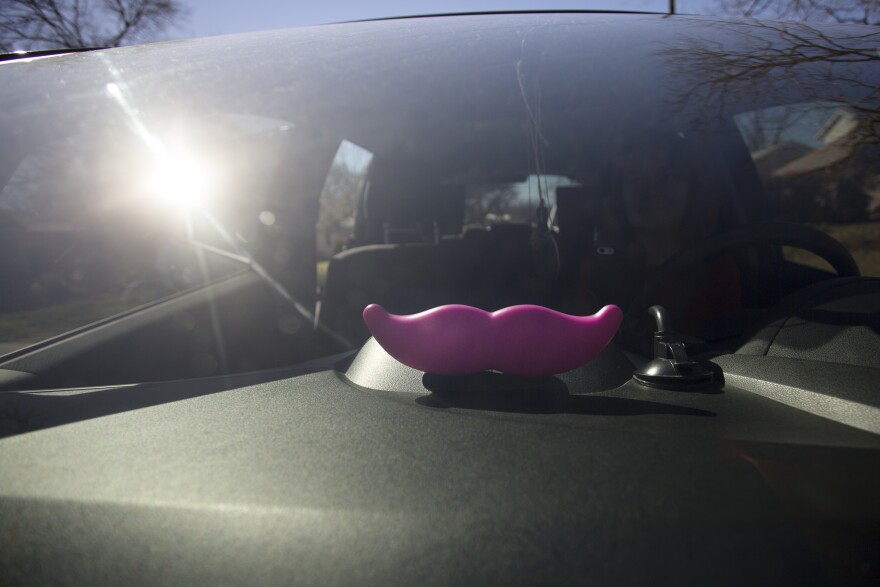When she’s not driving for ride-hailing companies Uber and Lyft, Sara Kaminsky works as a personal trainer. In fact, I exited her Toyota Corolla with a brochure for Shakeology, a weight loss program that helped Kaminsky shed more than 100 pounds over two years.
I confessed that I needed to get in shape. “I could help you with that,” said Kaminsky. But mostly she helped me with a free ride Thursday morning to my nearest polling station, at Maplewood Elementary School.
Unfortunately, it turned out that Maplewood will not be an acting polling station until Election Day, May 7. Kaminsky had apparently misread the map to which she was directed by Lyft’s early voting app. Still, my ride was free.
Since the start of early voting on Proposition 1 this week, Lyft has been offering free rides (up to $10) to shuttle voters to their nearest polling stations.
These rides appear to be legal. Nonetheless, some have raised concerns.
“To me, it doesn’t pass the smell test,” said former Council member Laura Morrison, acting as spokeswoman for Our City, Our Safety, Our Choice, an anti-Prop 1 political action committee. She acknowledged that offering rides to the polls is a common political practice.
But, she said, that generally happens “when you have nonprofit organizations come give folks rides to the polls where there is absolutely no financial benefit in the mix – whereas with Lyft doing it, it’s a different story.” Morrison said that normally a ride with Lyft costs something, and so making it free puts a clear monetary value on it.

On Monday, local Democratic political consultant Harold Cook took to Twitter to crowdsource some answers. He posted a photo of the pop-up from the Lyft app that reads, “Lyft is providing free rides, up to $10, to polling stations during early voting. Find your closest polling station and vote now. (Political Advertisement).” The message is followed by a pink button that reads, “Go Vote.”
Click on it, and you are taken to the website of Uber- and Lyft-funded PAC Ridesharing Works for Austin, where you can read that you should vote “for” Prop 1, plus plug in your address and find the closest place to vote. (Of note: As my trip to Maplewood illustrated, rides to all polling stations – whether they are open for early voting or not – are free through election day.)
When asked about the free service, Lyft’s Chelsea Wilson wrote in an email: “Making it easy and convenient for people to be heard at the polls – no matter how they vote – is something we are proud to do and have done across the country, most recently this Super Tuesday.”
But this time, the company has a stake in the outcome at the polls.
“Hmmm,” mused Cook on Twitter. “I could have sworn it was illegal to offer a thing of value in return for voting.”
It is. According to Title 8, Chapter 36, of the Texas Penal Code, it’s against the law to accept any “benefit as consideration for the recipient’s decision, opinion, recommendation, vote, or other exercise of discretion as a public servant, party official, or voter.”
But proving any relation between a ride and a vote is hard. My free ride was not dependent on my voting. In fact, I didn’t actually vote once I got to the polling place.
“I guess the question is, how do you ever prove how somebody voted?” asked Ross Fischer, a professor at the University of Texas School of Law who previously served five years on the Texas Ethics Commission. “So if someone says, ‘I’ll give you money to go in and vote for Prop 1,’ and someone goes inside and comes out and says, ‘I voted for Prop 1,’ how do you know whether they did that or not?”
"So there is something materially different and new about this. The companies themselves are very directly involved in the politics of this measure."
Fischer imagined another scenario, one in which he would be more hesitant to claim that Lyft is acting within the law.
“Now, if they said, ‘Go in, come back out with your ‘I voted’ sticker, and we’ll give you a $10 coupon,' now that’s a little more questionable,” he said. But in this case, that’s not happening. “The customer is getting the $10 credit to get to the polling places, and that’s where it ends. They’re not under any obligation to go in and vote at all.”
In my case, I got out of the car and walked home.
Offering rides to the polls is nothing new. “This is one of the oldest tricks in the book in terms of helping people get to the polls in the hope that they would vote for your cause,” said Jim Henson, who directs the Texas Politics Project at UT Austin.
Politicians do this all the time. It’s just that in this case, he said, the corporation is acting as the politician.
“So there is something materially different and new about this,” he said. “The companies themselves are very directly involved in the politics of this measure.”
One law that clearly will apply to Lyft’s free-ride strategy is the state’s campaign finance requirements. While Texas election code does not require corporations to disclose funds used to pay for get-out-the-vote campaigns targeting “stockholders” or “members” (or family members of these), it has to disclose for expenditures used on people unrelated to the company.
A spokesperson for Lyft wrote by email that the company would be including these rides in its latest PAC filing – due today.
This story was produced as a part of KUT's reporting partnership with the Austin Monitor.






